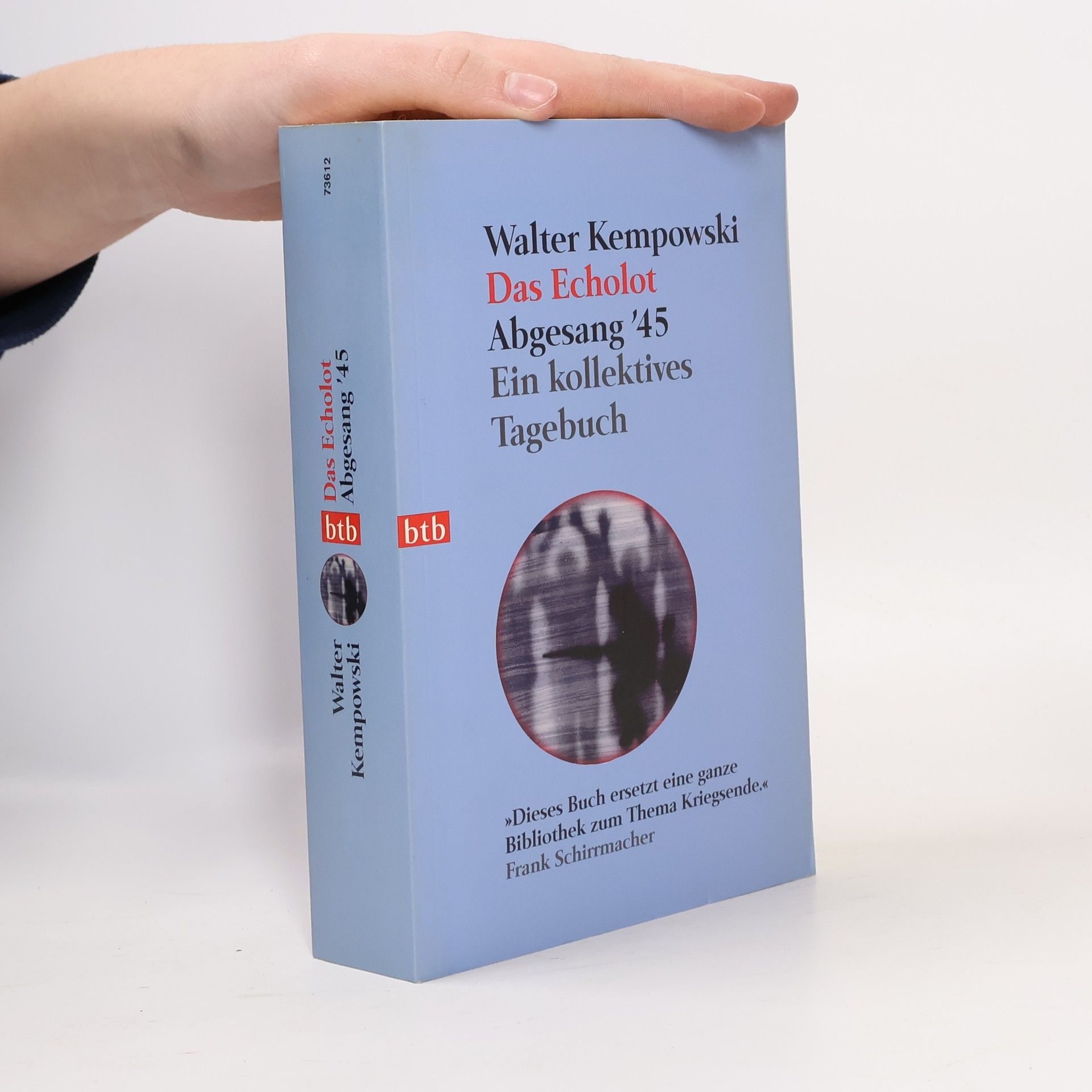Mark und Bein
- 285 stránok
- 10 hodin čítania
Während einer Reise nach Danzig und Masuren 1988 entdeckt der in Hamburg lebende Jonathan Fabrizius (Jg. 1945) seine nie gekannte Heimat. - Zeitkritisch-ironische Erzählung.
Walter Kempowski bol nemecký spisovateľ, známy svojou rozsiahla sériou románov "Deutsche Chronik" a monumentálnym dielom "Echolot". Jeho tvorba sa vyznačuje kolážovitým prístupom, kde spracováva autobiografické spomienky, listy a ďalšie dokumenty súčasných svedkov kľúčových historických udalostí. Kempowski majstrovsky skladal fragmenty minulosti do pôsobivého literárneho celku, čím skúmal kolektívnu pamäť a jej dopad na jednotlivcov. Jeho dielo ponúka jedinečný pohľad na nemecké dejiny a ľudské skúsenosti v nich.






Während einer Reise nach Danzig und Masuren 1988 entdeckt der in Hamburg lebende Jonathan Fabrizius (Jg. 1945) seine nie gekannte Heimat. - Zeitkritisch-ironische Erzählung.
Ein buergerlicher Roman
Winter, January 1945. It is cold and dark, and the German army is retreating from the Russian advance. Germans are fleeing the occupied territories in their thousands, in cars and carts and on foot. But in a rural East Prussian manor house, the wealthy von Globig family tries to seal itself off from the world. Peter von Globig is twelve, and feigns a cough to get out of his Hitler Youth duties, preferring to sledge behind the house and look at snowflakes through his microscope. His father Eberhard is stationed in Italy - a desk job safe from the front - and his bookish and musical mother Katharina has withdrawn into herself. Instead the house is run by a conservative, frugal aunt, helped by two Ukrainian maids and an energetic Pole. Protected by their privileged lifestyle from the deprivation and chaos around them, and caught in the grip of indecision, they make no preparations to leave, until Katharina's decision to harbour a stranger for the night begins their undoing.
Set in Rostock in 1939, the narrative unfolds as the Kempowski family adjusts to their new apartment. It captures intimate moments during a family meal, a visit to the grandfather, and interactions with the neighbor's daughter, highlighting the dynamics of family life and the social environment of the time. Through these scenes, the story weaves together personal and communal experiences, reflecting the complexities of familial relationships against the backdrop of a changing world.
Der Angriff auf die Sowjetunion am 22. Juni 1941 war der Anfang vom Ende Hitlers. Zwischen Berlin und Moskau starben mehr Menschen als an allen anderen Fronten des Zweiten Weltkrieges. In seinem neuen Echolot-Band hat Kempowski Dokumente von russischer und deutscher Seite aus jener Zeit zu einer höchst bewegenden Collage verwoben. "Barbarossa '41" zeigt die Schrecken des Krieges aus wechselnden Perspektiven: menschenverachtende Politiker kommen ebenso zu Wort wie ranghohe Militärs, Intellektuelle ebenso wie einfache Soldaten und Zivilisten. Entstanden ist so ein erschütterndes Mosaik des Krieges über alle Grenzen hinweg.
Der abschließende Band des beispiellosen Echolot-Unternehmens. Es sind die hochdramatischen letzten Tage Hitlerdeutschlands, die Kempowski auf beklemmend eindringliche Weise wie einen Film vor dem Leser abrollen lässt. Die minutiöse Rekonstruktion aus Briefen, Tagebuchaufzeichnungen, Quellen und Bildern ermöglicht einen erschütternden Blick auf Leid, Propaganda, Irrsinn.
Walter Kempowski hat in jahrelanger Arbeit eine einzigartige Collage aus Briefen, Tagebüchern und Dokumenten geschaffen. Sie bietet eine minutiöse Rekonstruktion des Alltags und historischer Ereignisse während der Schlacht von Stalingrad, einem dramatischen Wendepunkt deutscher Geschichte.
Wie kaum ein Schriftstellerleben ist die Biographie Walter Kempowskis von der Geschichte der beiden deutschen Staaten geprägt. Seine Erzählung »Im Block« ist die unbestechliche Momentaufnahme einer Zwangsgemeinschaft am Rande der Gesellschaft. Im Jahr 1948 wird der 19jährige Walter Kempowski aus Rostock wegen angeblicher Spionage von einem sowjetischen Militärgericht zu 25 Jahren Haft verurteilt. Acht Jahre sitzt er im berüchtigten DDR-Zuchthaus Bautzen. Dann wird er begnadigt. 1969 erscheint sein beklemmender literarischer Bericht aus einer Welt außerhalb des bürgerlichen Alltags. »Im Block«, das ist ein Leben in drangvoller Enge, isoliert, passiv, inhaltsarm. Die Häftlinge bilden eine eigene Gesellschaft, die geprägt ist vom Eingeschlossensein, von qualvoll gedehnter Zeit und von seltenen Augenblicken, die nur entfernt an das Glück eines erfüllten Daseins erinnern. Entstanden sind eindringliche, scharf ausgeleuchtete Bilder einer Existenz, die den Betroffenen all das verweigert, was menschliche Selbstverwirklichung ausmacht: Arbeit, Liebe, Besitz. 1987 erschien dieser Bericht, der den Beginn der schriftstellerischen Existenz Walter Kempowskis markiert, erstmals im Knaus Verlag, ergänzt um während der Haft angefertigte Zeichnungen des Autors. Ausstattung: 30 s/w-Abbildungen